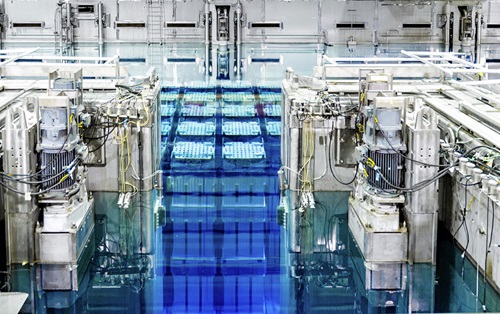
Nuclear pools - a safe storage of spent fuel before recycling
After a few years of cooling in pools at nuclear power plants, used fuels are shipped to the Orano La Hague plant by road, rail, or sea. Specific casks are used that are designed to resist fires, immersion, and drops.
The first operation at the Orano La Hague site is the unloading of these casks. The fuel assemblies are then placed in baskets stored in pools.

Underwater storage is a solution ideally suited to the characteristics of the fuel to be stored and enables keeping all later management options open.
Storage in pools allows more efficient cooling than in air, simplified monitoring (visual inspection), and makes it easier to manage the fuel going forward, notably for processing/recycling operations.
Recycling avoids the accumulation of used fuel in pools by recovering nuclear materials, which are then reused to produce electricity, and by safely and durably conditioning the ultimate waste.
Recycling avoids the accumulation of used fuel in pools
Each year, Orano La Hague receives around 1,100 metric tons of fuel which is initially stored in pools. This volume is then reduced since 90% of this fuel is processed for later recycling, either as MOX or recycled uranium.
At the end of 2020, Orano La Hague pools had 200 spaces available, which is equivalent to 10 years' storage at a filling rate of 20 spaces used per year on average in normal operation.
In addition, by introducing new baskets in the available spaces and by removing used industrial equipment stored in the pools, the La Hague site could increase its storage capacity if necessary.
EDF, the French electricity utility, currently recycles used fuel once. Each year, around 100 metric tons of used MOX fuel is thus stored in the pools of the Orano La Hague site pending later processing, to be performed at the customer’s request.
Orano has already performed operations to process used MOX fuel in the past. Orano and other players in the sector started an R&D program of studies and experiments in 2017 to industrialize a large-scale multi-recycling process in pressurized water reactors. Using a test assembly in a reactor is planned for 2025-2028. This program is underway according to the multi-year energy program. It will ultimately save up to 30% of the uranium supplying the fuel cycle.
Additional storage capacity will be necessary over the decade 2030
There is consensus that beyond 2030, new storage capacity for used fuel from EDF reactors in operation will be necessary, in keeping with the conclusions of the debate around the PNGMDR (French National Plan for the Management of Radioactive Materials and Waste).
In 2020, EDF commissioned Orano to study the feasibility of locating its used fuel storage pool on the La Hague site.
The facility must enable long-term storage of used MOX and ERU fuel (not currently recycled), independently of the industrial strategy associated with generation IV reactors. Its provisional operating time is around 100 years.
The projected facility consists of an initial 6,500-metric ton pool (around 13,000 assemblies) and availability (surface area, junction preparation
Orano La Hague proposes solutions for increasing the storage capacity in its pools
To maintain a significant level of availability in its storage pools and deal with contingencies, Orano La Hague has proposed a wide range of solutions such as densifying current pools.
Densification consists of increasing the used fuel storage capacity in our pools while complying with existing decrees. The La Hague site will thus have 3,600 additional metric tons whose operational implementation will start in 2025.
The densification project will increase by 30% the storage capacity of the three pools at the La Hague site. The modification entails using baskets with a smaller cross-section and made of a specific material already used for transport equipment and in the United States for several decades.
- Proven expertise in recycling and nuclear waste management The nuclear industry manages its conventional and radioactive waste using very rigorous, very carefully controlled methods. Orano has been transforming and recycling nuclear materials for over 50 years.
- Plutonium : an incomparable energy power For more than 50 years, the French nuclear industry has opted for recycling its nuclear fuel.
- Recycled uranium, an energy source for low-carbon electricity While one of the major environmental challenges along with that of the climate is saving resources, the nuclear industry has been choosing to recycle nuclear materials for over 50 years now to save on natural resources and reduce the volume of final waste.